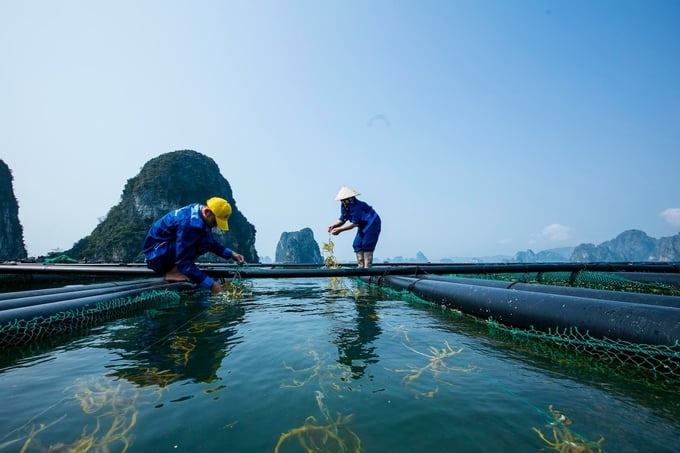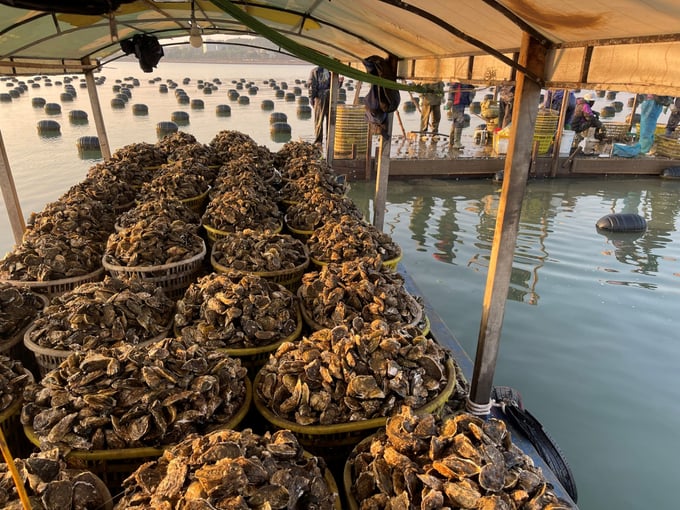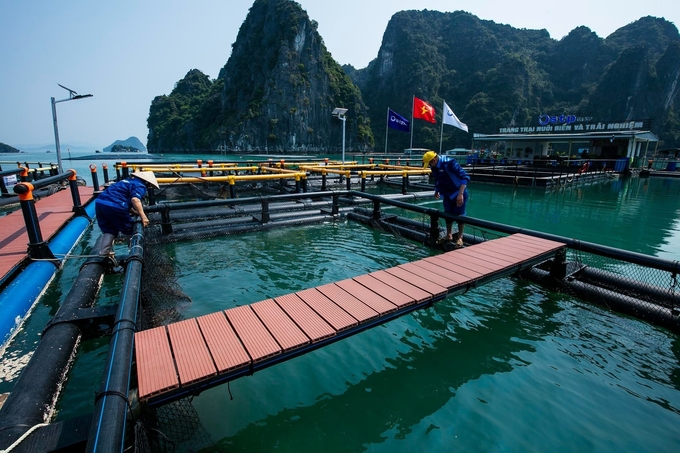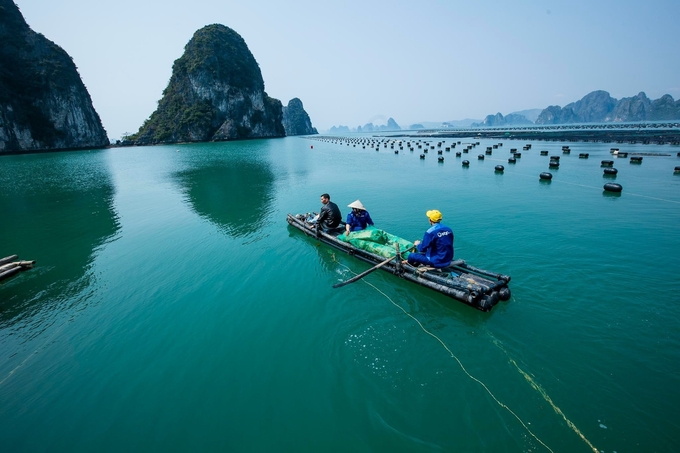May 16, 2025 | 10:29 GMT +7
May 16, 2025 | 10:29 GMT +7
Hotline: 0913.378.918
May 16, 2025 | 10:29 GMT +7
Hotline: 0913.378.918

STP Group's seaweed farming area in the waters of Van Don district, Quang Ninh province. Photo: Nguyen Thanh.
Quang Ninh province has a 250km long coastline from Mong Cai City to Quang Yen Town, with a sea surface area of about 60,000 hectares; The freshwater surface area capable of aquaculture is nearly 13,000 hectares.
In addition, Quang Ninh has an important strategic location, synchronous waterway, land and air transport infrastructure, is part of the planning of the national coastal economic zone system, and has a large consumer market such as the US market. Northeast Asia, the Red River Delta and the inner province. This potential and advantage create the foundation for sustainable development of the fisheries industry—especially industrial and high-tech aquaculture.
However, the fisheries economy of Quang Ninh province is currently not fully exploiting its potential and advantages. The reason is that the planning and management of farming areas, water surface allocation and leasing are still slow and many problems exist.
The current situation shows that aquaculture planning is still overlapping and unstable. Investment in technical infrastructure and fisheries logistics services is still scattered, inconsistent and ineffective. Especially in coastal waters, destructive fishing still exists.
Meanwhile, the demand for aquatic products is increasing. The profitable farming area will be narrowed due to conflicts in development space with industrial activities, urbanization and tourism.
According to Mr. Do Dinh Minh, Director of the Department of Fisheries of Quang Ninh province, one should not overuse the sea surface area of localities with widespread planning. Each region and specific farming object should be planned and priority should be given to localities with potential and strengths.
In particular, some aquaculture organizations and individuals still fear administrative procedures. Therefore, up to now, in the province, no marine aquaculture collective, household or individual has been assigned a marine area by the competent authority according to regulations.
Quang Ninh province has 8/11 coastal localities with detailed plans for salt and brackish aquaculture with an area of about 11,700 hectares. However, these localities have not yet had detailed planning approved for implementing water surface allocation and leasing for aquaculture activities.

Oyster farming area of Rong Bien Cooperative (Tuan Chau ward, Ha Long city) before demolition. Photo: Nguyen Thanh.
Mr. Nguyen Van Tang, Rong Bien Cooperative (Tuan Chau ward, Ha Long City), shared that the cooperative wrote an application to request authorities at all levels to consider and resolve water surface licensing for households in Tuan Chau ward and 69 members of Dragon Sea Cooperative.
Mr. Do Dinh Minh said that the authority to approve the aquaculture area planning project belongs to the localities, some localities hire consultants to prepare the project, some localities do it themselves.
"At the same time, organizations, cooperatives, and businesses rely on the area integrated into the provincial planning to prepare documents to apply for an aquaculture license. Conditions for applying for an aquaculture license include application and project explanation, environmental impact assessment report, plan, commitment to environmental protection, and the diagram. The diagram element is extracted from the local map. If it is unavailable, the file cannot be completed", Mr. Minh shared.

STP Group invests in marine farming and experiential tourism in the waters under the farming license planning. Photo: Nguyen Thanh.
In addition, most localities still have problems with the environmental impact assessment reporting stage, which falls under the jurisdiction of the environmental resources sector. The ecological resources industry is based on the actual situation to know which projects need environmental impact assessment and which do not.
According to regulations, the water surface area of 3 nautical miles from the low tide line to the sea will be allocated and leased by the district People's Committee; range of 3 - 6 nautical miles implemented by the Provincial People's Committee; beyond 6 nautical miles managed by the Central level. Currently, there is no low tide line, so it is impossible to clearly define the level of authority to manage, deliver, and lease water surfaces for aquaculture to organizations and individuals. In Quang Ninh, there are currently difficulties in determining the distance from the shore to 3 nautical miles, using the lowest low tide line for many years, but the province has a sea reclamation program.
Island communes such as Quan Lan and Ngoc Vung have thousands of people and governments but are located beyond 6 nautical miles. If they want to hand over the water surface to the people, they must fall under the jurisdiction of the Ministry, even though it is located right near the shore of the island.

The allocation and lease of specific sea surface areas to individuals and organizations is essential. Photo: Nguyen Thanh.
Thus, integrating the development orientation of the fisheries industry in the planning of Quang Ninh province for the period 2023 - 2030 is the legal basis for assigning aquaculture marine areas to organizations, businesses and individuals.
According to the Department of Agriculture and Rural Development of Quang Ninh province, localities need to coordinate with functional branches to review and functionally zone marine space to develop aquaculture according to its potential and immediate solutions sustainably; Clearly identify areas capable of aquaculture according to each type, develop a plan to allocate marine areas according to Decree 11 of the Government.
Translated by Tuan Huy

(VAN) Cold-barn systems efficiently manage environmental and temperature conditions, which aids in the prevention of respiratory diseases in pigs and protects them from the vectors that transmit African swine fevers.

(VAN) To tackle challenges, the project 'Addressing key technical bottlenecks in the grouper supply chain in Vietnam' has been underway since 2024.

(VAN) The project 'Disease-Resilient and Sustainable Cassava Production Systems in the Mekong Region', funded by the Australian Center for International Agricultural Research (ACIAR), is being implemented from 2024 to 2028.

(VAN) Data from 10,000 farming households will help professionalize production organization and support the implementation of the One Million Hectares Program for High-Quality, Low-Emission Rice Cultivation.

(VAN) FAO Director-General QU Dongyu marks International Day of Plant Health at NENA conference.

(VAN) Deputy Minister of Agriculture and Environment Hoang Trung affirmed that floriculture and ornamental plants are a growing industry that receives significant global attention.

(VAN) The three staple crops dominating modern diets – corn, rice and wheat – are familiar to Americans. However, fourth place is held by a dark horse: cassava.